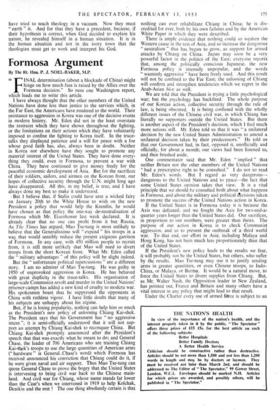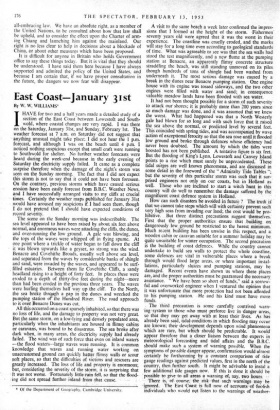Formosa Argument
By The Rt. Hon. P. J. NOEL-BAKER, M.P. F 64 INAL determination (about a blockade of China) might hinge on how much fuss is raised by the Allies over the Formosa decision." So runs one Washington report, which leads me to write this article.
I have always thought that the other members of the United Nations have done less than justice to the services which, in the Far East, the Americans have rendered to the world. Their resistance to aggression in Korea was one of the decisive events in modern history. Mr. Eden did not in the least overstate the restraint which they have shown throughout the fighting, or the limitations on their actions which they have voluntarily imposed to confine the fighting to Korea itself. In the truce- talks they displayed patience and a will for peace with a foe whose good faith has, alas, always been in doubt. Neither in Korea nor elsewhere have they sought to promote any material interest of the United States. They have done every- thing they could, even in Formosa, to prevent a war with China. They have continued to give money freely for the peaceful economic development of Asia. But for the sacrifices of their soldiers, sailors, and airmen on the Korean front, our hopes of collective security through the U.N. might long ago have disappeared. All this, in my belief, is true, and I have always done my best to make it understood.
. But I believe that, if Stalin could have sent a wicked fairy on January 20th to the White House to wish on the new President a policy that would help the Kremlin, he would have chosen as that policy the one-way de-neutralisation of Formosa which Mr. Eisenhower last week declared. It is already clear that no one can profit from it but Russia. As The Times has argued, Mao Tse-tung is most unlikely to believe that the Generalissimo will " expend " his troops in a way that would sensibly reduce the present exiguous garrison of Formosa. In any case, with 450 million people to recruit from, it is still more unlikely that Mao will need to divert troops from the short Korean front. What Mr. Eden called the " military advantages " of this policy will be slight indeed.
But the " unfortunate political repercussions " are a different story. I am no admirer of Mao Tse-tung. He was guilty in 1950 of unprovoked aggression in Korea. He has behaved with great duplicity in the truce-talks. His organisation of large-scale Communist revolt and murder in the United Nations' prisoner-camps has added a new kind of cruelty to modern war. His spokesmen boast that he suppressed the opponents in China with ruthless vigour. I have little doubt that many of his subjects are unhappy about his regime. But, if he is losing popularity, nothing can help him so much as the President's new policy of unloosing Chiang Kai-shek. The President says that his Government has " no aggressive intent "; it is semi-officially understood that it will not sup- port an attempt by Chiang Kai-shek to reconquer China. But Chiang Kai-shek promptly announced after the President's speech that that was exactly what he meant to do; and General Chase, the leader of 700 Americans who are training Chiang Kai-shek's troops to use the large quantities of American arms (" hardware" is General,Chase's word) which Formosa has received announced his conviction that Chiang could do it, if he were given naval and air support. Thus Mao Tse-tung can quote General Chase to prove the bogey that the United States is intervening to bring civil war back to the Chinese main- land. And civil war for Chiang, whose name stands fai lower than the Czar's when we intervened in 1919 to help Kolchak, Denikin and the rest ! The one thing absolutely certain is that
•
nothing can ever rehabilitate Chiang in China; he is dis- credited for ever, both by his own failures and by the ArneriCan White Paper in which they were described. There is ample evidence that nothing could so weaken the Western cause in the rest of Asia, and so increase the dangerous " neutralism " that has begun. to grow, as support for armed attacks by Chiang on China. Japan may soon be a very powerful factor in the politics of the East; everyone reports that, among the politically conscious Japanese, the new Formosa policy is intensely unpopular, and the words " wantonly aggressive " have been freely used. And this result will not be confined to the Far East; the unloosing of Chiang will confirm and strengthen tendencies which we regret in the Arab-Asian bloc as well.
We are told that the President is trying a little psychological war; but the psychology has backfired. The whole purpose of our Korean action, collective security through the rule of law, is being obscured. It is being confused with the wholly different issues of the Chinese civil war, in which Chiang has literally no supporters outside the United States. But there is another aspect of the President's decision, which I find much more serious still. Mr. Eden told us that it was " a unilateral decision by the new United States Administration to amend a unilateral decision taken by their predecessors." He told us that our Government had, in fact, opposed it, unofficially and officially, for about a month; our views had been listened to, and then brushed aside.
One commentator said that Mr. Eden " implied " that neither Britain nor the other members of the United Nations " had a prescriptive right to be consulted." I do not so read Mr. Eden's words. But I regard as very dangerous— dangerous to the United Nations and to peace—the fact that some United States opinion takes that view. It is a vital principle that we should be consulted both about what happens in Formosa, and about the military and political decisions taken to promote the success of`the United Nations action in Korea.
If the United States is in Formosa today it is because the Axis was defeated; and we fought the Axis for two-and-a- quarter years longer than the United States did. Our sacrifices.
in proportion to our numbers, were greater than theirs. The purpose of our action in Korea is to check Communist aggression, and so to prevent the outbreak of a third world war. To that end, our effort in Asia", including Malaya and Hong Kong, has not been much less proportionately than that of the United States.
If the President's new policy leads to the results we fear, it will probably not be the United States, but others, who suffer by the results. Mao Tse-tung may use it to justify sending arms in greater quantities, or even Chinese troops, to Indo- China, or Malaya, or Burma. It would be a natural move, to force the United States to divert supplies from Chiang. But, as Mr. Walter Nash, the Opposition leader in' New Zealand, has pointed out, France and Britain and many others have a vital interest in any policy that might lead to that result.
Under the Charter every use of armed Rime is subject to an all-embracing law. We have an absolute right, as a member of the United Nations, to be consulted about how that law shall be upheld, and to consider the effect upon the Charter of arm- ing Chiang and launching him against the mainland. Our right is no less clear to help in decisions about a blockade of China, Or about other measures which have been proposed.
It is difficult for anyone in Britain who holds Government office to say these things today. But it is vital that they should be understood. I have said them here because I have always supported and admired the policy of the United States, and because I am certain that, if we have proper consultation in the future, the dangers we now fear will disappear.



































 Previous page
Previous page